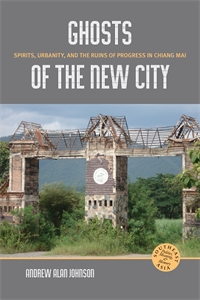Ghosts of the New City: Spirits, Urbanity, and the Ruins of Progress in Chiang Mai
- About the Book
-
Chiang Mai (literally, “new city”) suffered badly in the 1997 Asian financial crisis as the Northern Thai real estate bubble collapsed along with the Thai baht, crushing dreams of a renaissance of Northern prosperity. Years later, the ruins of the excesses of the 1990s still stain the skyline. In Ghosts of the New City, Andrew Alan Johnson shows how the trauma of the crash, brought back vividly by the political crisis of 2006, haunts efforts to remake the city. For many Chiang Mai residents, new developments harbor the seeds of the crash, which manifest themselves in anxious stories of ghosts and criminals who conceal themselves behind the city’s progressive veneer.
Hopes for rebirth and fears of decline have their roots in Thai conceptions of progress, which draw from Buddhist and animist ideas of power and sacrality. Cities, Johnson argues, were centers where the charismatic power of kings and animist spirits were grounded; these entities assured progress by imbuing the space with sacred power that would avert disaster. Johnson traces such magico-religious conceptions of potency and space from historical records through present-day popular religious practice and draws parallels between these and secular attempts at urban revitalization.
Through a detailed ethnography of the contested ways in which academics, urban activists, spirit mediums, and architects seek to revitalize the flagging economy and infrastructure of Chiang Mai, Johnson finds that alongside the hope for progress there exists a discourse about urban ghosts, deadly construction sites, and the lurking anxiety of another possible crash, a discourse that calls into question history’s upward trajectory. In this way, Ghosts of the New City draws new connections between urban history and popular religion that have implications far beyond Southeast Asia.
- About the Author(s)
-
Andrew Alan Johnson, Author
Andrew Alan Johnson is Assistant Professor of Anthropology at Princeton University.David P. Chandler, Series Editor
Rita Smith Kipp, Series Editor
- Reviews and Endorsements
-
The book is both ethnographically and theoretically captivating; each chapter recounts how the entanglements of
the haunting ghosts and the haunted urban architectures and exclusive communities produce a series of social discourses on progress, cultural essence, and social discontent. . . . The strengths of this book are shown in Johnson’s rich ethnographic materials and ample theoretical engagements.
—American Anthropologist- This colourful and detailed book analyses how Thailand's northern capital of Chiang Mai is struggling with progress. . . . Students of Thai culture should find this book provocative and highly informative. Specialists in urban studies should also find this book a valuable example of analysing urban development through the perspective of culture.
—New Mandala - Ghosts of the New City makes an important contribution to Thai studies, urban studies, and ethnography. . . . The book is a stellar example for scholars of Southeast Asian studies in particular, demonstrating an analytics that operates within the cracks between hegemonic frameworks and regimes of knowledge.
—TRaNS: Trans-Regional and-National Studies of Southeast Asia - General readers are likely to find the book engaging, as Johnson provides many vivid vignettes and stories drawn mainly from his field work, though they may also find it at times mystifying. . . . For readers interested in the complex uncanny of (post) modern subjectivity, and certainly for specialists of Thai scholarship, the book is a rich contribution on contemporary Thailand from a closely attentive ethnographer.
—Pacific Affairs
- Supporting Resources
-










